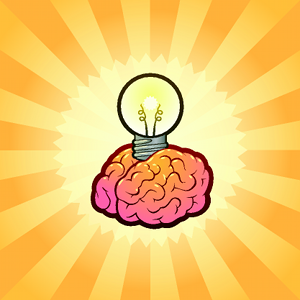 The human brain is incredible. From joy to sadness, love to hate, peace to war…whether it’s a trip to the moon or a trip to the store, the human brain makes it all possible. So how much do you know about this mass of neurons and glia? Here’s a few basic facts to get you started.
The human brain is incredible. From joy to sadness, love to hate, peace to war…whether it’s a trip to the moon or a trip to the store, the human brain makes it all possible. So how much do you know about this mass of neurons and glia? Here’s a few basic facts to get you started.
1. There are billions of neurons in your head.
Common claims are 100 billion, but research-based estimates actually suggest 86 billion neurons. And 85 billion other cells! Either way, there’s a lot going on up there and in comparison to other species, our abundance of neurons is what sets us apart—not (as commonly thought) our brain size, brain-to-body ratio, neuron to non-neuronal cell ratio, or the relative size of our cerebral cortex, according to a recent PNAS review on the subject.
2. Your brain is plastic.
Not made of plastic, but made with plasticity, meaning it can be shaped and changed with new experiences. This is true for all ages, even if there are certain aspects of brain function (i.e. language acquisition) that are sensitive to critical periods of development. Every time that you learn something new, feel positive or negative emotion, or take a drug that acts within the brain, you create, weaken, or reinforce connections between neurons. These connections influence your future behavior.
3. You can inherit susceptibility to psychiatric and neurological disorders…you can also work to prevent them.
While there’s no guarantee that you’ll develop your grandmother’s depression or your father’s obsessive-compulsive tendencies, you may be at increased risk of developing disorders that run in your family when you encounter stress or other environmental factors. Depression risk is a great example. Depression risk is influenced by the form of the serotonin transporter gene you’ve inherited—there’s a short version and a long one. People born with the short form produce less of the transporter. They clear less serotonin from the synapse, and in turn are more likely to develop depression when facing mild to moderate stressors. Odds are even worse if they’re born with two short-form alleles of the gene (one from each parent).
The good news? Even in the worst case scenario – an individual with two short alleles and a number of life stressors – less than half actually develop depression. So while you can inherit increased risk, genetics isn’t deterministic; many other environmental and genetic factors may help compensate for one “bad” gene. And if you know you’re at risk, you’re one step closer to prevention.
4. You can generate your own neurons—and your own neural stem cells!
Even in adults, new neurons are “born” in the brain and capable of integrating into existing neural networks. In fact, these new neurons begin as stem cells, and adult neural stem cells may one day be used to treat neurodegenerative diseases, the biggest advantage being that you could be your own donor.
5. You can influence how many new neurons you generate.
Exercise increases neurogenesis, the process of generating new neurons, in the brain. Not surprisingly, it also reduces depression and anxiety and protects against dementia in the elderly. Alcohol consumption, on the other hand, decreases neurogenesis.
To sum up, your brain is highly complex and open to change. You can make the most of it by engaging as many of those billions of neurons as much as possible every day. Every moment of your individual experience is important for neuroplasticity and neurogenesis. By being aware of your individual risk factors and learning ways to improve brain health, you can work to prevent psychiatric and neurological disorders and foster an overall sense of well-being.
Click Here For Article References:2. Caroni P, Donato F, Muller D. Structural plasticity upon learning: regulation and functions. Nat Rev Neurosc. 13: 478-490. PMID: 22714019
3. Caspi A., Sugden K., Moffitt T.E., Taylor A., Craig I.W., Harrington H.L., McClay J.M., et al. Influence of Life Stress on Depression: Moderation by a polymorphism in the 5-HTT gene. Science 301 (2003) PMID:12869766
4. Kendler K.S., Kuhn J.W., Vittum J., Prescott C.A., and Riley B. The interaction of stressful life events and a serotonin transporter polymorphism in the prediction of episodes of major depression. Arch. Gen. Psychiatry 62: 529-535 (2005) PMID:15867106
5. Emsley J.G., Mitchell B.D., Kempermann G., and Macklis J.D. Adult neurogenesis and repair of the adult CNS with neural progenitors, precursors, and stem cells. Prog. Neurobiol. 75: 321-341 (2005) PMID:15913880
6. Olson AK, Eadie, BD, Ernst C, Christie BR. (2006) Environmental enrichment and voluntary exercise massively increase neurogenesis in the adult hippocampus via dissociable pathways. Hippocampus. 16: 250-260. PMID: 16411242.
7. Anderson ML, Nokia MS, Govindaraju KP, Shors TJ. (2012) Moderate drinking? Alcohol consumption significantly decreases neurogenesis in the adult hippocampus. Neuroscience. Aug 18 [Epub ahead of print] PMID: 22906480
Image: Shutterstock/Nicholas Kinney















I’m in love with this amazing website. Tks.
i am to!
The brain is amazing – of course. But WHAT IS IT about the human person that is conscious of the brain’s vast knowledge? It can’t be the brain itself. It must be ‘the Subject’ which the brain serves. But what IS the Self of a human person? A computer is not CONSCIOUS of knowing the data it stores and is programmed to organise. It’s hardly surprising that religion speaks of a spiritual entity often called the soul. Christian theology says that the conscious individual is both body (material) and soul (spiritual). Makes sense to me. Even though it shuts the door in the face of Science.